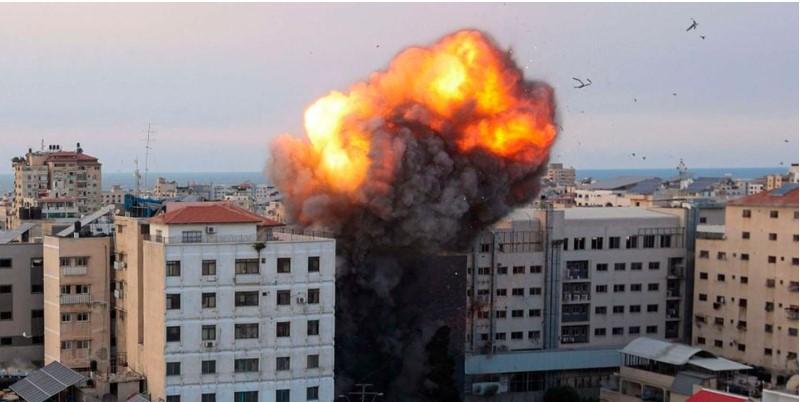Kenya’s Mixed Response to Israel-Hamas Conflict
Kenya seems to have backtracked on its earlier position on the Israel-Palestine conflict, clarifying that its condemnation of the violence related strictly to acts of terrorism.
Foreign Affairs Principal Secretary Korir Sing’oei told PoliticalPulseChat on Tuesday that Nairobi was condemning terrorism, which it has done consistently as Kenya has also been a victim in the past.
“Kenya’s reaction, as indicated in the statement by the President, was focusing on a particular incident, that is the new terrorist attacks. Terrorism anywhere is completely unacceptable,” he said.
“That has nothing whatsoever to do with our long-standing position on the Israel-Palestine conflict. Kenya continues to be a victim of terrorist attacks and that is what we condemned.”
Critics had argued Nairobi was departing from the African Union’s position, which often avoids labeling acts of violence by Palestinians as terrorism and calls for a peaceful solution by creating two contiguous independent states.

Dr Sing’oei said Kenya still supports calls for a peaceful resolution including the two-state solution, saying, Nairobi has also raised concerns with the blatant violation of international humanitarian law including targeting of civilian sites and attacking non-combatants.
“We are also concerned with the retaliatory attacks on the part of Israel. It looks like it is excessive and not proportional. The best thing is a return to the path of peace,” he said.
President William Ruto had on Saturday pledged “solidarity” with Israel and said Kenya “unequivocally condemns terrorism and attacks on innocent civilians in the country [Israel].
All acts of terrorism and violent extremism are abhorrent, criminal, and unjustifiable, regardless of the perpetrator, or their motivations,” the Head of State said in a statement.
Since that morning raid, the conflict has snowballed into a battle of rocket launches and aerial bombardments, with the death toll approaching 2,000 people on both sides by the close of last evening.
Israel responded by declaring “war” on Hamas and blockaded the entire Gaza Strip. Kenya had on Saturday called for de-escalation, admitting the conflict was complex, and declaring “our firm stand in solidarity with all those calling on the parties to desist from further attacks.”
Kenya’s statement tallied with Rwanda’s, which condemned “this act of terror, particularly targeting innocent civilians” although it called for de-escalation.
DRC President Felix Tshisekedi also “firmly condemned the terrorist attacks that struck the state of Israel on Saturday, causing heavy loss of life and many injuries.” He received flak from local activists.
However, theirs was at variance with other countries in the region, as well as the African Union.
The AU Commission labeled the new conflict as “hostilities” and blamed Israel for planting its seed. “The chairperson (Mousa Faki Mahamat) wishes to recall that denial of the fundamental rights of the Palestinian people, particularly that of an independent and sovereign State, is the main cause of the permanent Israeli-Palestinian tension,” said a statement from the AU Commission.
“The chairperson urgently appeals to both parties to put an end to military hostilities and to return, without conditions, to the negotiating table to implement the principle of two States living side by side, to safeguard the interests of the Palestinian people and the Israeli people.”

Yesterday, Kenyan churches waded into the conflict, expressing concern over the loss of innocent lives in the ongoing war. Speaking under the auspices of the Kenya Coalition of Church Alliances and Ministries (KCCAM), which is chaired by Bishop Geoffrey Njuguna, the clerics condemned the violence between Israel and Hamas militants in the Middle East.
KCCAM, however, has supported Israel in a war that has seen critics condemn it for responding to attacks from Hamas with disproportionate force.
“As representatives of the Church in Kenya. We are deeply concerned by the indiscriminate attacks by Hamas against the Israeli people. We are deeply saddened by the loss of life and the unimaginable pain and suffering of Israeli civilians, especially women and children,” Bishop Njuguna told journalists in Nairobi yesterday.
KCCAM appealed for an immediate ceasefire, urging both sides to prioritize peaceful co-existence and work towards de-escalating the violence. “We earnestly appeal for peaceful coexistence between the two nations,” Bishop Njuguna added.
KCCAM also called on Hamas to release the women and children that it is holding hostage. Addressing concerns about media coverage during this tumultuous period, Bishop Njuguna stressed the need for impartial and accurate reporting.
Such responsible journalism, he said, will go a long way toward finding an amicable solution to the current crisis. “We have observed with deep concern the increasing incidents of anti-Semitism on various media platforms, especially social media. We have seen first-hand the consequences of hate speech in perpetuating cycles of violence, and therefore urge the media covering the ongoing conflict to be impartial,” he said.
Kenya’s Mixed Response to Israel-Hamas Conflict
